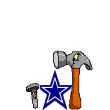InmanRoshi
Zone Scribe
- Messages
- 18,334
- Reaction score
- 90
What has Parcells troubled — what has him waking up choking on his bile — isn’t what you might expect. It’s not concern that the Commanders’ coaching staff could spring something on the Cowboys for which they are entirely unprepared. And it’s not his team’s raw ability. It’s a thing that’s harder to put into words, and impervious to strategy. Even as he is trying to study his next opponent, he can’t shake what happened on Sunday. How his team, the moment the Jaguars pushed back, collapsed. How, the moment the players felt the pressure, they began to commit penalties and the sort of small but critical mental errors that only a coach watching video can perceive. In their performance he smells the sort of failure he defines himself against.
At the back of Parcells’s personal binder there are a few loose, well-thumbed sheets that defy categorization: a copy of a speech by Douglas MacArthur; a passage from a book about coaches, which argues that a coach excels by purifying his particular vision rather than emulating a type. Among the papers is an anecdote Parcells brings up often in conversation, about a boxing match that took place nearly 30 years ago between the middleweights Vito Antuofermo and Cyclone Hart. Parcells loves boxing; his idea of a perfect day in the off-season is to spend it inside some ratty boxing gym in North Jersey. “It’s a laboratory,” he says. “You get a real feel for human behavior under the strongest duress — under the threat of physical harm.” In this laboratory he has identified a phenomenon he calls the game quitter. Game quitters, he says, seem “as if they are trying to win, but really they’ve given up. They’ve just chosen a way out that’s not apparent to the naked eye. They are more concerned with public opinion than the end result.”
Parcells didn’t see the Hart-Antuofermo fight in person but was told about it, years ago, by a friend and boxing trainer, Teddy Atlas. It stuck in his mind and now strikes him as relevant. Seated, at first, he begins to read aloud from the pages: how in this fight 29 years ago Hart was a well-known big puncher heavily favored against the unknown Vito Antuofermo, how Hart knocked Antuofermo all over the ring, how Antuofermo had no apparent physical gifts except “he bled well.” “But,” Parcells reads, “he had other attributes you couldn’t see.” Antuofermo absorbed the punishment dealt out by his natural superior, and he did it so well that Hart became discouraged. In the fifth round, Hart began to tire, not physically but mentally. Seizing on the moment, Antuofermo attacked and delivered a series of quick blows that knocked Hart down, ending the fight.
The Commanders video is still frozen on the screen behind Parcells. He is no longer sitting but is now on his feet. “This is the interesting part,” he says, then reads:
“When the fighters went back to their makeshift locker rooms, only a thin curtain was between them. Hart’s room was quiet, but on the other side he could hear Antuofermo’s cornermen talking about who would take the fighter to the hospital. Finally he heard Antuofermo say, ‘Every time he hit me with that left hook to the body, I was sure I was going to quit. After the second round, I thought if he hit me there again, I’d quit. I thought the same thing after the fourth round. Then he didn’t hit me no more.’
“At that moment, Hart began to weep. It was really soft at first. Then harder. He was crying because for the first time he understood that Antuofermo had felt the same way he had and worse. The only thing that separated the guy talking from the guy crying was what they had done. The coward and the hero feel the same emotions. They’re both human.”
When Parcells finishes, he says: “This is the story of our last game. We were Cyclone Hart.”
http://www.nytimes.com/2006/10/29/s...90&partner=rssuserland&emc=rss&pagewanted=all


